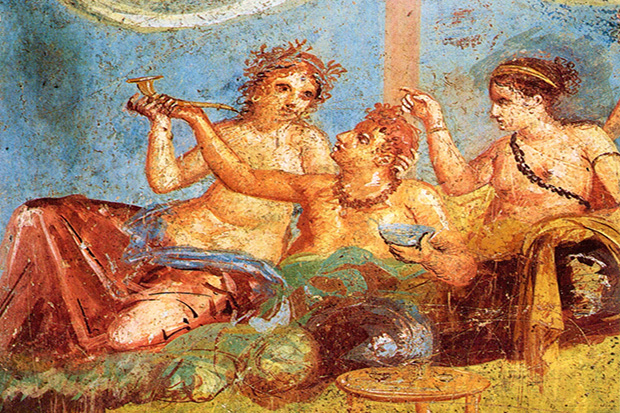How the ancient Romans spiced up their lives — pepper!
Whether it was for getting animals to mate or treating menstrual bleeding, the Romans found many unusual — and sometimes downright nasty — uses for the spice.

A Roman fresco with a banquet scene from Pompeii.
Evan McDuff, MA'19, wrote his master’s thesis on spices in ancient Rome. This essay is adapted from an article McDuff and his adviser, associate professor of classical studies Joel Christensen, wrote earlier this year for the online journal "Eidolon."
Pepper. What meal is complete, what kitchen is ready without it? It’s been found buried in the scorching sands of Berenike, Egypt and waterlogged in the cesspits and wells of Roman settlements in Germany, England
Three out of four recipes in a Roman cookbook call for it. Pepper, the king of spices, is one of the most influential spices in history.
Our culinary research into pepper is aimed at understanding the flavors of ancient cuisine and, through this, the ancient Roman and Greek cultural preference for certain flavors.
While the Greeks employed pepper and spices in wine, they were sparing in its use in food. In large part, pepper appears in ancient Greek food only when its presence is deemed medically beneficial.
For instance, the physician Diphilius from the island Siphnos suggests serving pepper paired with cumin on scallops because the combination of botanicals helps with digestion.
The Romans, on the other hand, adored spicing up their food. Pepper is called for in 75 percent of the 468 recipes found in the one-of-a-kind Roman period cookbook Apicius, where the spice is featured in sauces, roasted pork and hare, vegetable purees and mulled wines.
The poet Martial remarks on the habitual use of pepper in even the most basic of Roman dishes, saying, “Oh, with the insipid beet, the luncheon of laborers, how often the cook looks to pepper and wine.”
Pepper also spiced up Greek and Roman lives as medicine. Numerous extant sources comment on its curative power for ailments from hemlock poisoning to excessive menstrual bleeding. In many prescriptions, pepper was added to wine or some other concoction for oral ingestion.
Take, for instance, a medical experiment presented by the Roman physician Galen: A man suffering from colic was given several horrible treatments, including a mixture of honey boiled with pepper.
Although the full sequence of treatments is a bit unclear, Galen seems to suggest that, following earlier treatments of rue and castor oil, the honey-pepper concoction was administered through the rectum.
Galen notes that this application of pepper caused the patient extraordinary amounts of suffering. It’s worth noting that once Galen decided to halt the treatment the man made a full recovery.
At least one ancient source prescribes the spice as part of good animal husbandry. In “De Natura Animalium” (“On the Characteristics of Animals"), the author and teacher Aelian recounts several methodologies that shepherds employed to encourage their sheep to mate.
One method: rub honey and pepper on the hindquarters of female animals. Apparently, this would cause females to “dote upon” the males of the herd. In other words, the females would grind up against anything, including the males, to get relief from the irritating sensation caused by the pepper’s volatile chemicals
Part of the mystery — and pleasure — of dealing with our evidence for ancient food and spices
While written sources give us a good idea of how pepper was used in the ancient Mediterranean, such sources represent
Pepper helps us understand how much we take for granted when it comes to evidence for the ancient world and how much we still have to learn. And, if all else fails, studying more about ancient spices can inspire us to try some new recipes — or even make plans for a Saturday night.
Categories: Humanities and Social Sciences, Research





